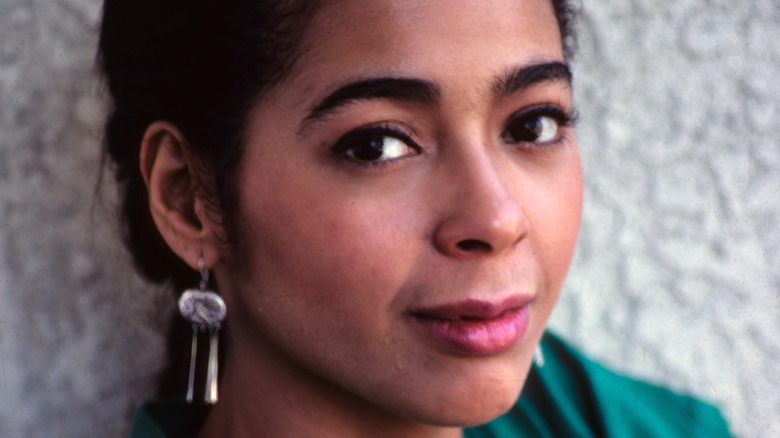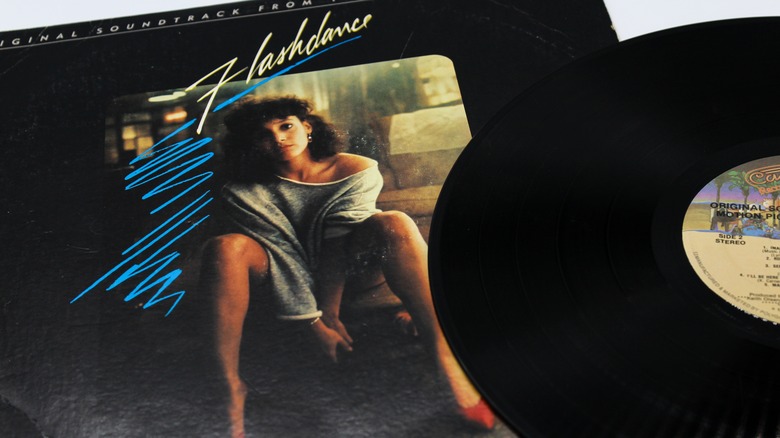Everything We Know About Fame Star Irene Cara's Last Days
Irene Cara, the 1980s actress, and singer who starred in the film "Fame" and sang the title song, along with the iconic hit "Flashdance ... What a Feeling" from the movie "Flashdance," passed away at the age of 63 on November 25, as BET reported. For a brief period in the late 1970s-early 1980s, she was one of the biggest things going: As iHeart Radio reports, she made history at the 1980 Academy Awards by being one of only a handful of performers to sing two songs during the same ceremony. She also racked up a couple of Grammy nominations, a Golden Globe nomination, and a couple of lower-tier industry awards as well. She was even on track to star in a TV version of "Fame" but turned it down to focus on recording.
For someone who was, however briefly, so huge, her star dimmed almost instantly, and she spent the next several decades in near-total anonymity, likely by design, at least towards the end. In fact, as the New York Post reported, so anonymous was Cara in her final days that her neighbors, with whom her relationships were strained in some cases, said that they didn't even know their neighbor had once been a major pop star.
Irene Cara's Career Ends In An Instant
Irene Escalara was born in 1959 in the Bronx, according to The New York Times, although she tried valiantly to obscure her age on more than one occasion. By the age of 5, she had reportedly learned to play the piano by ear, and by her tweens she was a "busy performer," as the Times describes it. By the age of 13, she'd landed a role on "The Electric Company," and would spend the next several years building up her acting and singing profiles.
Her big break came in 1980 when she scored the role of Coco Hernandez in the groundbreaking musical "Fame." However, in 1985 she sued Al Coury, the head of the label Network Records, alleging that the label had cheated her out of royalties. The lawsuit effectively ended her career; rightly or wrongly, she was labeled "difficult to work with," and that shut down her options almost immediately.
"All of a sudden, I was hearing stories about how difficult I was to work with, ridiculous rumors about drugs and what a diva I was. It was blown out of proportion," she said. She also reportedly had difficulty with cocaine during this period, although she says that she "never had to go to rehab or a program," via People.
Hard Times
By 1991, Irene Cara was bordering on being broke, and her career was effectively over. As People reports, what savings she had she'd sunk into legal costs in her lawsuit against her former label, and the lawsuit wouldn't be resolved until 1993. She'd sued for $10 million, but a jury awarded her only $1.5 million — and the label never paid it, as they went bankrupt, according to the New York Post. She'd also left her husband of several years. Wanting a change, she left New York for San Francisco.
"I worked on me, my spirituality. I went through my bitter, angry periods because these people took so much from me," Cara told People. "She had been through hard times, but she's a fighter," added her aunt, Rosemary Redding.
The next few decades would see Irene Cara being basically invisible, save for low-profile and unsuccessful attempts at re-entering the music scene. As Songwriter Universe explained, in 2011 she formed a group, Hot Caramel. By this time she'd moved to Florida and, to hear her tell it, wasn't doing too bad. "I have a beautiful home by the beach and life is good. [These days] I live off my royalties and I work when I want to, and I consider myself semi-retired. I don't need to work ... I make more money not working than I do by working," she said.
Final Years As A Recluse
In her final years, according to the New York Post, Irene Cara lived in Largo, Florida, and was apparently so secretive and reclusive that some of her neighbors didn't even know who she was. "She didn't talk to anyone. I didn't even know it was her living there until a few years ago. It was the best-kept secret ever," said neighbor Roseann Nolan. Neighbor Maria Contreras said that she frequently tried to engage Cara and get her out of her house, but Cara would refuse. Further, Contreras said that Cara would only contact her neighbor via her computer and not her cell phone, so concerned was she about privacy. "She didn't look well and she said she had health issues," Contreras said.
Her manager, Betty McCormick, also reported that the Covid-19 pandemic drove Cara into even further reclusivity. "She was very afraid of getting the [COVID] virus. She really struggled during that period," said McCormick, who insisted that drugs or alcohol played no role in Cara's death, and that her death was not a suicide. As of December 7, 2022, her cause of death has not been publicly revealed.



